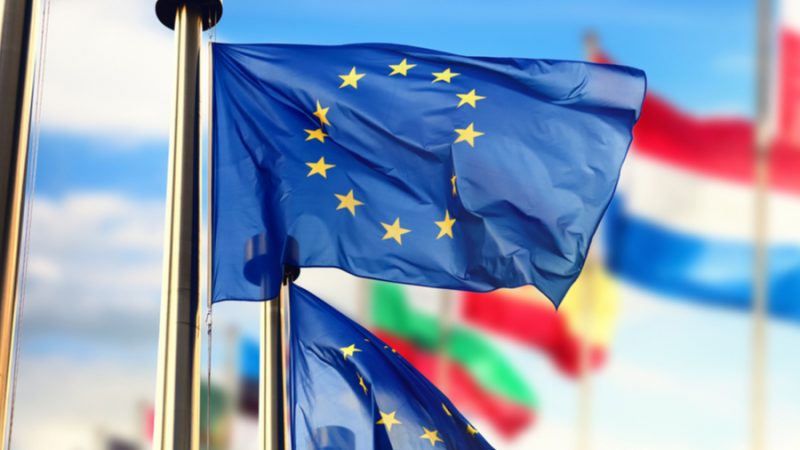Giving hope comes with responsibility to us, say activists from new EU enlargement countries

LGBTI activists from new EU enlargement countries, Ukraine, Moldova and Georgia have gathered in Brussels to call on EU representatives to live up to the promise that comes with the accession process
Today, LGBTI activists from Ukraine, Moldova and Georgia met with EU representatives in Brussels to explain serious challenges facing lesbian, gay, bisexual, transgender and intersex (LGBTI) people in their countries, and urge European institutions and Member States to live up to the hope they have given in granting all three countries prospects of becoming members of the EU.
In the wake of Russia’s invasion of Ukraine, the EU has made enlargement a priority in the eastern neighbourhood region, recently opening the path for Ukraine, Moldova and Georgia to join the EU. Ukraine and Moldova were granted candidate status by the EU Council in June 2022, and just last month the European Commission advised that Georgia should also receive candidate status at the upcoming December Council.
The prospect of joining the EU is an important motivation for governments to make reforms on advancement of rule of law and protection of fundamental rights. It is especially important in this context that the EU insists that the protection of LGBTI people’s human rights are a core part of those requirements, as governments are often falling behind the requirements. Recommendations from the EU regarding the human rights of LGBTI people are key tools supporting LGBTI organisations to engage with their governments and hold them accountable to the commitments made.
In all three countries hate crime and hate speech against LGBTI people remains a serious issue. While both Moldova and Georgia have legislation protecting against hate crime on the grounds of sexual orientation and gender identity, hate crimes are consistently not registered and prosecuted. Ukraine still needs to adopt such legislation, which is currently being debated in parliament. Despite the international obligations of these countries to provide a legal framework for the recognition of same-sex couples, none of them have adopted such legislation. The inequality this creates is particularly highlighted in Ukraine at this time, where the lack of rights of same-sex partners of soldiers wounded or killed are laid bare. International standards as regards legal gender recognition are that the procedure should be quick, transparent and accessible without abusive requirements. Currently all three countries fail to live up to this for different reasons.
Says Rina Rybalko from Gender Stream, Ukraine: “We believe that Ukraine being an EU candidate country shows bilateral willingness to cooperate and integrate, especially in terms of common values, human rights standards and opportunities. This is an important step towards strengthening democratic values and supporting civil society in Ukraine, where freedom, diversity and human rights are a priority.”
Leo Zbancă from GENDERDOC-M in Moldova says: ”The LGBTI community in Moldova faces risks due to growing anti-LGBTI narratives promoted by pro-Russian forces. We see Moldova’s move to join the EU as vital for protecting LGBTI rights and ensuring the dignity and safety of the community.”
According to Mariam Kvaratskhelia from Tbilisi Pride: “Georgia should be granted candidate status and should move further on the EU integration path without sacrificing LGBTI rights and equality, which is unfortunately what the government is currently doing.”
The accession process comes with hope in candidate countries that the prospect of EU membership will help secure a better life for LGBTI people through the implementation of EU law and standards. However, the road to EU accession can be long, and hope and ambition can turn into disillusionment and disengagement if reforms are not seen through and the efforts of people and governments are not supported and awarded by the EU.
According to Executive Co-director at ERA, Danijel Kalezić from Montenegro, which became a candidate country in 2010: “In the last 15 years in the Western Balkans, we saw how the EU enlargement process can highly contribute to the legal protection and advancement of human rights for LGBTI communities. Unfortunately, we have also seen how a lack of direct and visible political support from the EU to grassroots movements in crucial moments can result in providing a space for anti-democratic movements to stop progress achieved and push the backsliding that is currently ongoing in our region.”
The meetings between activists and EU representatives in Brussels this week were facilitated by ILGA-Europe, the largest umbrella organisation for the LGBTI movement in Europe. According to ILGA-Europe’s Advocacy Director, Katrin Hugendubel, “These meetings are essential because we need to ensure that all EU institutions engaged in the enlargement process understand what is at stake – the huge potential to work for better respect of LGBTI people’s human rights through the process, but also the big risk of backlash in case the EU is not following through the accession promises.
“We see in the Western Balkans after years of active engagement on advancing human rights and fulfilling accession conditions, people are now disillusioned and the influence and leverage of the EU is quickly diminishing. Tensions in the region are high and the influence of other global forces is very real and worrying. In Georgia, Moldova and Ukraine, people want to move towards the EU and democratic reforms are undertaken to do so. The EU needs to support these efforts and stand clear on its promise of accession.”